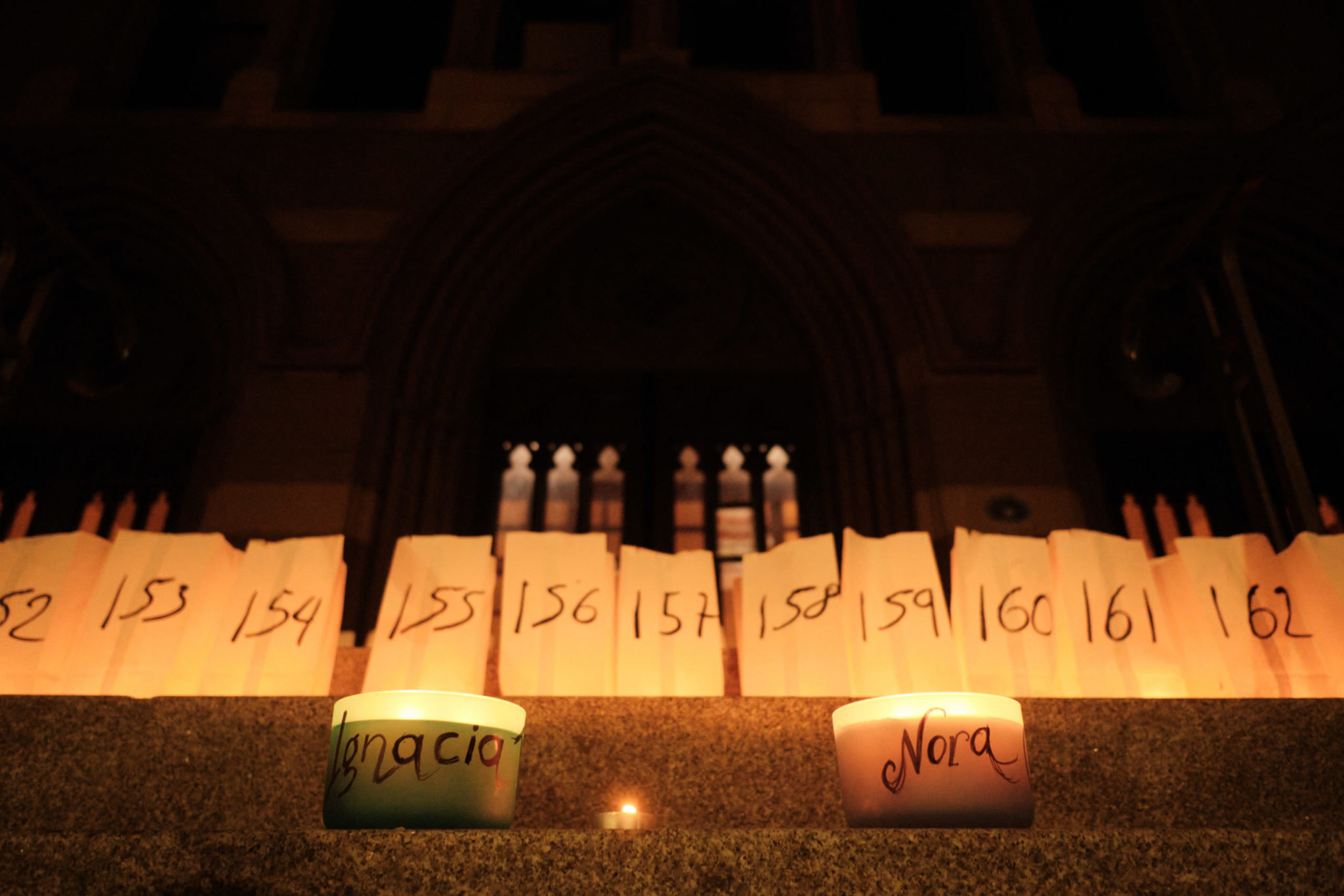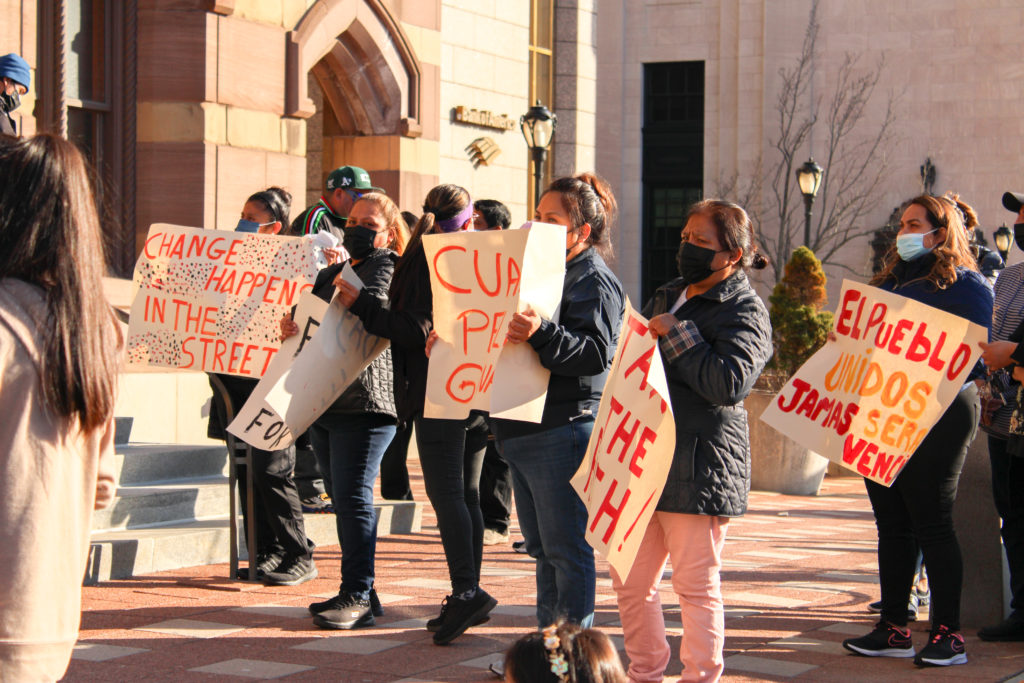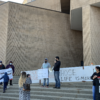
Lukas Flippo, Photo Editor
Members of Unidad Latina en Acción gathered on Monday for a vigil, lighting 186 candles: one for each New Haven resident who has died of COVID-19. The vigil, along with a separate demonstration earlier on Monday, sought to address the pain and hardship brought on by the pandemic.
Around 20 residents gathered on the steps of City Hall on Monday night for the vigil — a commemorative event organized by ULA in partnership with Black and Brown United in Action. Attendees arranged rows of white paper bag lanterns numbered from one to 186, placing in each bag a small lit candle. The glowing line of lights spanned the length of City Hall’s steps, a somber reminder of the total number of New Haven residents who have lost their lives during the pandemic.
Two additional jar candles were lit in front of the sea of white paper bags in special remembrance of Ignacia Teniza and Nora Garcia, two ULA volunteers who were among the Elm City’s victims of COVID-19. Teniza’s family was present on Monday and shared their remembrance with fellow vigil attendees.
“She was a grand woman, and was a character who always helped the less fortunate,” Teniza’s sister-in-law Teresa Torres said in Spanish, as translated by the News. “Her absence is so large, for her two daughters, and for us as a family. We will always have her memory, her good advice; she will always be present in our hearts.”
Teniza’s husband, Clemente Teniza, said in Spanish that his family has been in great economic need and is moving forward “bit by bit.” He said that the ULA has been supportive of the family in various ways and continues to be a united community in the face of the pandemic.
ULA organizer Megan Fountain told the News that the other victim, Nora Garcia, contracted the novel coronavirus while working as a custodian at the University of New Haven. During the pandemic, she had led a unionization effort with her co-workers in hopes of securing overtime payment and fairer treatment. Though the effort was ultimately unsuccessful, Fountain recounted Garcia being a faithful participant of ULA’s volunteer work.

Change happens in the streets
In the separate event earlier on Monday, more than 70 residents met for a demonstration organized by ULA and Black and Brown United in Action at the same site.
“El cambio pasa en las calles,” or “change happens in the streets,” many of the demonstars’ signs announced.
Organizers extended an open invitation for attendees to speak, with many of them recounting experiences of homelessness, insecurity and health issues during the pandemic. Fountain and ULA lead organizer John Lugo provided live translation in English and Spanish for the audience.
Annex resident Sofia Tecocoatzi took a moment to acknowledge the members of the New Haven and Latinx community who have lost employment, housing security and their lives during the last year.
“We have lost so much during this pandemic,” Tecocoatzi said in Spanish. “We have lost our jobs. We have lost lives. Some of us have lost our homes, as you just saw today. But we are still fighting.”

‘Giving crumbs’: Economic assistance amid the pandemic
ULA’s demands for local and state leaders center on the economic struggles of Latinx communities and undocumented workers during the pandemic. During Monday’s rally, the organization advocated for tax relief for working-class families, improvement in wage protections for vulnerable workers and paid sick days for all workers.
ULA member Jessie Rivera told the crowd that she had been “hungry since yesterday,” despite having received a stimulus check. She said she could not imagine what undocumented residents without government help were going through, noting that many of them are the essential workers who “keep our economy going.”
“The government is giving crumbs to the people who are putting their lives on the line,” Rivera told the crowd. “We need assistance for everyone, and a recovery for everyone, not just a few of us.”
Fountain told the crowd that at least 15 ULA members have become homeless during the pandemic. She noted that decreased shelter capacities and the members’ undocumented status make government assistance inaccessible. As a result, one of those ULA members told rally attendees that he and his friends have since been living in the woods throughout the winter in snowstorm conditions.
To address the income inequalities exacerbated by the pandemic, ULA has put its weight behind the passage of H.B. 6654, which would create a child tax credit tax for those families making under $210,000 a year. The group has argued that this bill provides relief for working- and middle-class earners with children, including undocumented immigrant workers who pay taxes, with Individual taxpayer identification numbers.
Rally attendees also called for the city and state to “more fairly” tax institutions like Yale as well as the state’s wealthiest residents.
“We are here calling on that university to pay its fair share,” Tecocoatzi told the crowd in Spanish. “We are here calling on the state of Connecticut to raise tax revenue and at the same time give tax relief to working people like us.”
Health care and vaccines for all
Rally attendees also discussed the health care issues the Latinx community faces. A primary goal of the group is the extension of the benefits of HUSKY, Connecticut’s Medicaid health program to residents of the state who are undocumented.
“We deserve health care,” Tecocoatzi said of the city’s immigrant community. “We deserve services and human rights in the state of Connecticut.”
The group also said that Latinx individuals — especially undocumented individuals — are also at a high risk of contracting and developing serious symptoms from COVID-19. According to a survey conducted by ULA of 558 undocumented members, 20 percent reported having underlying health issues such as asthma and diabetes, while 21 percent reported working at frontline jobs where they said employers did not implement adequate COVID-19 safety measures.
ULA is also particularly concerned about vaccine hesitancy in Latinx community, which Rivera called “understandable” for a variety of reasons, recounting as an example the Puerto Rican Pill Trials, where the United States government tested a birth control drug on Puerto Rican women before it was approved as safe in the mainland U.S.
She encouraged her neighbors to unite as a community and work towards vaccinating all those who are eligible.
Early data on Connecticut vaccination rates suggests that rates among Latinx and Black residents were lagging significantly behind those of white residents. Recent nonprofit vaccination efforts have focused on neighborhoods like Fair Haven that have high Latinx populations, and administrators with the Yale New Haven Health system as well as city officials have launched multiple campaigns to address these inequalities. Surveys conducted in the last month suggest that Black and Latinx individuals are now more likely to plan to get a vaccine than they were three months ago.
“It’s time to get past that hesitancy and look forward to better health and a better situation,” Rivera said.
Going forward, Fountain called on members of the Latinx community to continue the fight against economic assistance and vaccine hesitancy.
“So, but we still have so much to fight for, we still have so many people suffering with deep needs in our community,” Fountain said at the rally. “So I invite you to continue to make sure that this movement grows bigger and stronger.”
Unidad Latina en Acción was formally established in 2002.

Regina Sung contributed reporting and translation.
Isaac Yu | isaac.yu@yale.edu
Razel Suansing | razel.suansing@yale.edu
Interested in getting more news about New Haven? Join our newsletter!









